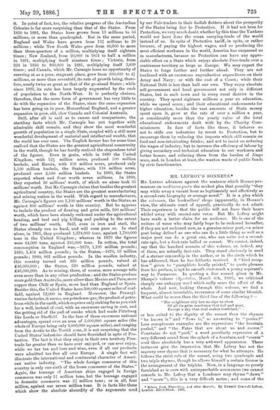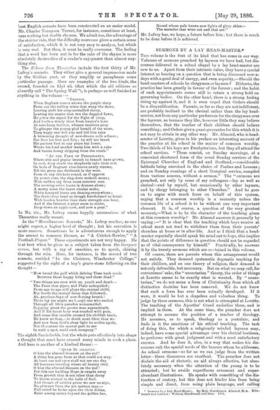MR. LEFROY'S SONNETS,
MR. LEFROY advances against the sentence which Horace pro- nounces on mediocres poeto the modest plea that possibly "they may while away a vacant hour as legitimately and effectively as a second-rate biography or average novel." It is a plea which the col:mace, the booksellers' shops (apparently, in Horace's view, the ultimate court of appeal), practically do not admit. Their experience is that the public will not have their hours whiled away with second-rate verse. But Mr. Lefroy might have made a better claim for an audience. He is one of the writers of verse who may fairly hope to be reckoned hereafter, if they are not reckoned now, as a genuine minor poet, —a minor poet being defined as one who can do a little thing as well as a major poet can do a great one, who can write not a second- rate epic, but a first-rate ballad or sonnet. We cannot, indeed, say that the hundred sonnets of this volume, or, indeed, any of them, are actually first-rate. They stand obviously in need. of a sterner censorship in the author, or in the circle which he has addressed, than he has hitherto received. A "kind recep- tion" given to "pamphlets locally printed," to quote phrases from hi3 preface, is•apt to smooth over-much a young aspirant's way to Parnassus. In quoting a fine sonnet given in Mr. Sharpe's volume (Spectator, March 6th, 1886), we criticised sharply one unhappy word which sadly mars the effect of the whole. And now, looking through this volume, we find a frequent, almost invariable, recurrence of some similar blemish. What could be worse than the third line of the following ? — " The neighbour city be no sign to show
Of all its grim machines that toil and pant,
Except a sky that coal makes confidant."— or less suited to the dignity of the sonnet than the rhymes "he knows is" and "flows is," as answering to "posies ?" Less conspicuous examples are the expressions "the fountain purled," and "the Fates that are about us and coerce." Fountains do not "purl," a word peculiarly expressive of a very different sound from the splash of a fountain, and "coerce" used thus absolutely has a very awkward appearance These instances give the impression that Mr. Lefroy has not the mastery over rhyme that is necessary for what he attempts. He follows the strict rule of the sonnet, using two quadruple and two triple rhymes, though he allows himself a certain license in the arrangement of the triplets. Now, in a language so poorly furnished as is ours with unimpeachable assonances (we cannot concede to Mr. Lefroy that a Londoner may rhyme "dawn" and "morn "), this is a very difficult metre; and some of the • Echoes from Thoocritus, and other Sonnets. By Edward Oracroft Wray. Loudon: Elliot Stook. 1885.
best English sonnets have been constructed on an easier model. Mr. Charles Tennyson Turner, for instance, sometimes at least, uses nothing but double rhymes. We admit too, the advantage of the stricter rule, that the difficulty overcome gives a certain sense of satisfaction, which it is not very easy to analyse, but which is very real. But then, it mast be really overcome. The feeling that a word has been put in for the sake of the rhyme is more absolutely destructive of a reader's enjoyment than almost any- thing else.
The Echoes from Theocritus include the first thirty of Mr. Lefroy's sonnets. They either give a general impresssion made by the Sicilian poet, or they amplify or paraphrase some particular passage. Here are examples of the two kinds, the second, founded on Idyl vii. (that which the old editions so absurdly call "The Spring Wall "), is perhaps as well finished as anything in the volume :—
" DAPHNIS.
When Daphnis comes adown the purple steep From out the rolling mists that wrap the dawn, Leaving aloft his crag-encradled sheep, Leaving the snares that vex the dappled fawn, He gives the signal for the flight of sleep, And burls a windy blast from hunter's horn At rose-bung lattices, whence maidens peep To glimpse the young glad herald of the morn. Than haply one will rise and bid him take A brimming draught of new-drawn milk a-foam ; But fleet his feet and fain ; he will not break His patient fast at any place but home, Where his fond mother waits him with a cake And lucent honey dripping from the comb."
" AT THE FARM OF PHRASIDAMIIS.
Where elm and poplar branch to branch have grown, In cool, deep shade the shepherds take their rest
On beds of fragrant vine-leaves newly strown,
Till the great sun declineth in the west.
From th my thickets round, as if opprest By secret care, the ring-dove maketh moan; With sudden cry from some remoter nest The nooning owlet hunts in dreams alone ; A merry noise the burnt cicalas make, While honeyed horns are droning everywhere ; The fruit-trees bend as though foredoomed to break With burden heavier than their strength can bear, And if the faintest z.phyr seem to shake, Drop down an apple now, and now a pear."
In No. xix., Mr. Lefroy seems happily unconscious of what Theocritus really meant.
In the "Miscellaneous Sonnets," Mr. Lefroy reaches, as one might expect, a higher level of thought ; but his execution is more uneven. Sometimes he is adventurous enough to apply the sonnet to common themes, as "A Cricket-Bowler," "A Football-Player." These experiments are not very happy. He is at best when he gives us a subject taken from the lacrymce rerum, but with a ray of sunshine, so to speak, shining through the rain. Here, for instance, is the second of two sonnets, entitled "In the Cloisters, Winchester College," suggested by the sight of a boy's grave-stone following on the thought- " How broad the gulf which delving Time bath made Between those happy living and these dead."
"Two things are ever with us, youth and death— The Faun that pipes, and Pluto unbeguiled ; From age to age still plays the eternal child, Nor heeds the eternal doom that followeth. Ah, precious days of unreflecting breath ! There lay (so might we fancy) one who smiled Through all life's paradox unreconciled, Enjoying years the grown man squandereth. And if his latest hour was touched with pain, And some dim trouble crossed his childish brain, He knew no fear,—in death more blest than we. And now from God's clear light he smiles again, Not ill-content his mortal part to see In such a spot, amid such company."
The eighth line is feeble, but the whole puts effectively into shape a thought that mast have crossed many minds in such a place. And here is another of a kindred theme :— " QuEm DI DILIGUNT.
0 kiss the almond-blossom on the rod ! A thing has gone from us that could not stay. At least our sad eyes shall not see one day All baseness treading where all beauty trod. 0 kiss the almond-blossom on the rod ! For this our budding Hope is caught away From growth that is not other than decay To bloom eternal in the halls of God. And though of subtler grace we saw no sign, No glimmer from the yet unrisen star,— Full-orbed he broke upon the choir divine, Saint among saints beyond the golden bar, Round whose pale brows new lights of glory shine— The aureoles that were not and that are."
Mr. Lefroy has, we hope, a future before him ; but there is much to be done before it is achieved.



































 Previous page
Previous page